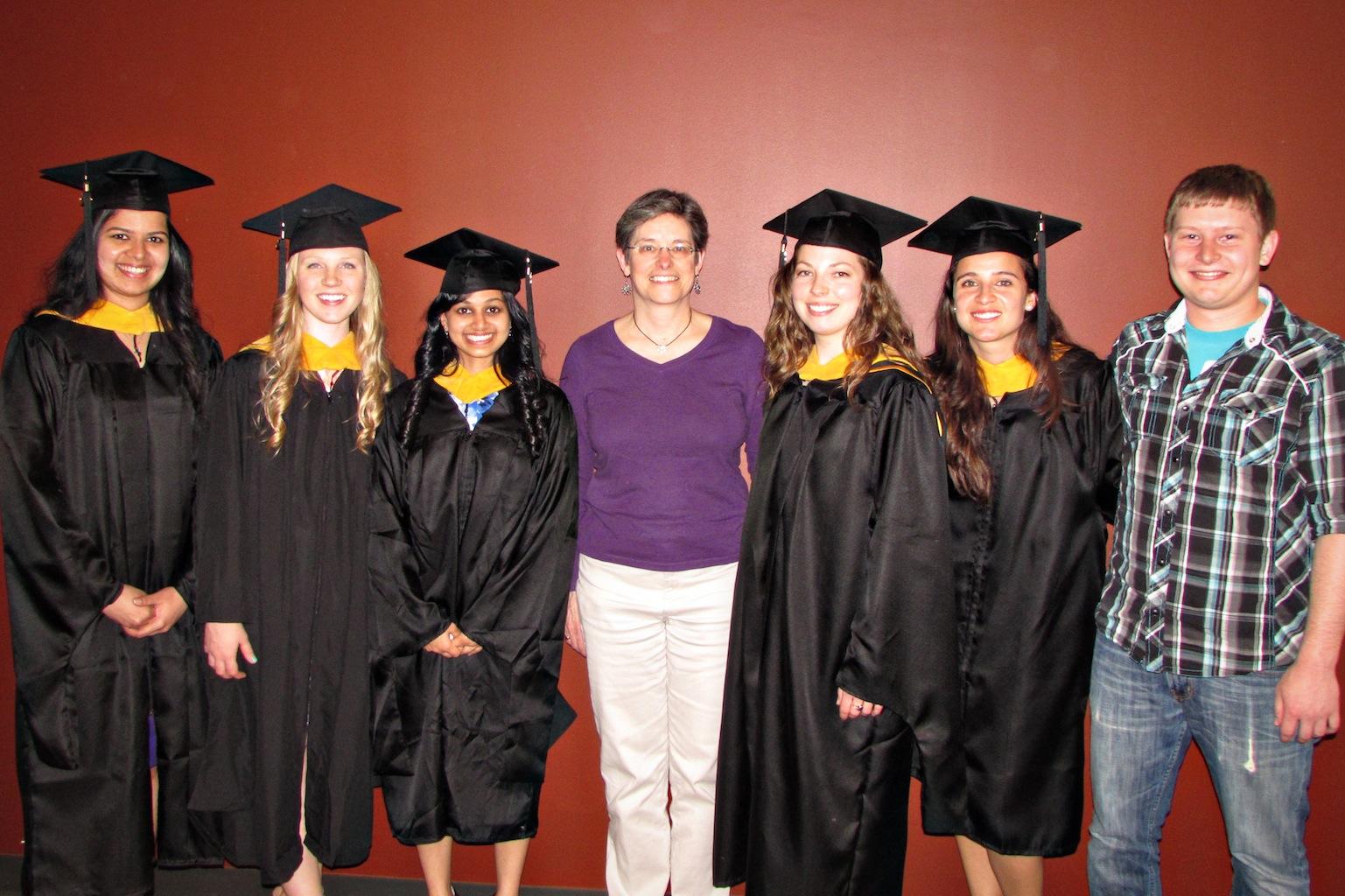
Preethi Swaminathan, pictured on the far left with other 2015 graduates of the Stem Cell Biology master's program at the University of Minnesota. Professor Susan Keirstead, fourth from the left, faciliates the program.
Stem cell research is a relatively new branch of science, dating back to the late 1960s, but there are already many biobusiness across the country, particularly in Minnesota, that help advance regenerative medicine. Unfortunately, though, there are only a handful of programs that provide enough training to college students who wish to pursue a career working with stem cells in the private sector. Biobusiness leaders seek qualified applicants who have expertise beyond an undergraduate degree, but they don’t necessarily require students to obtain a PhD, a path often pursued by those who wish to become professors.
The Master of Science Degree in Stem Cell Biology, offered through the University of Minnesota Stem Cell Institute, helps students and biobusinesses bridge this gap; those who join the program become equipped with the technical training required to perform complex and innovative tasks with stem cells and regenerative medicine in a business laboratory environment.
Despite efforts by professors, though, there is still the challenge of establishing connections between students, biobusinesses, graduate programs, and university faculty members. Students who seek advice on how to pursue a career at a biobusiness, for example, may not find proper resources from professors, individuals who have little experience maneuvering the private sector and establishing networks with business professionals. Also, biobusinesses sometimes lack the resources and connections to attract highly-qualified interns to get first-hand experience in the field.
To help address this issue, Professor Susan Keirstead is facilitating a program, funded through a Regenerative Medicine Minnesota (RMM) grant, which sends recent graduates of the University of Minnesota Stem Cell Biology master’s program directly into the workforce as paid interns. The program accepts two candidates per year to participate in an internship with an area biobusiness. One of these individuals is Preethi Swaminathan, a 2015 graduate of the Stem Cell Biology master’s program.
Preethi earned her Bachelor’s Degree in Industrial Biotechnology from SASTRA University in Thanjavur, India, and she was inspired to study stem cells because of the exciting potential that regenerative medicine has for the future of healthcare. After researching the courses and the labs offered at the University of Minnesota, she decided to enroll in the Stem Cell Biology program for the 2014 school year.
For her internship, Preethi is currently working for Bio-Techne, a holding company for clinical diagnostic and biotechnology brands such as R&D Systems, Novus Biologicals, and Cliniqua. Preethi maintains stem cells and works on refining the existing protocol to differentiate them into cardiomyocytes. The protocols are then sold in the form of user-friendly “differentiation kits” for researchers to easily obtain cardiomyocytes, which they can use for various scientific purposes.
She strongly believes that this grant helps foster a better relationship between professors, biobusinesses, and students, establishing a clear link between academia in the public sector and business in the private sector.
“Students should get experience in both the university and industry,” Preethi said, as this provides a broader picture of how stem cells are used in different environments. In academia, for example, researchers typically do their own research and pursue their individual ideas, whereas biobusinesses employees usually work towards group-oriented goals, performing relatively more routine tasks in the process.
“This will also be helpful for students to get a better understanding of their interests and passions,” Preethi said. “These internship opportunities will help students realize what type of environment they would like to work in as contributors to the field.”
She recommends that current undergraduate and Master’s students learn more about different biobusinesses, what services they offer, and which ones hire interns.
Upon concluding her Bio-Techne internship in February, Preethi would like to pursue other biobusiness opportunities and get more experience with different stem cells. Her ultimate goal is to earn a PhD, focusing specifically on the translational side of stem cell research and bringing regenerative medicine to patients, a process known as “bench to bedside” research.
Preethi is one of many students who have benefitted from educational grants offered by RMM. As it becomes increasingly clear that stem cells will be at the forefront of medical advancement, we need a highly-trained and educated workforce who will continue enhancing our understanding of regenerative medicine. Growing upon the robust academic, medical, and professional institutions in Minnesota, RMM will continue supporting educational initiatives that keep the state on the cutting edge of regenerative medicine discoveries and applications.
